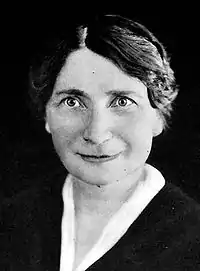Emilia Fogelklou
Emilia Maria Fogelklou-Norlind (20 July 1878 in Simrishamn - 26 September 1972 in Uppsala, Sweden) was a Swedish theologian, feminist, women's historian, pacifist and author.[1]
Emilia Fogelklou | |
|---|---|
 Emilia Fogelklou in the 1930s. | |
| Born | July 20, 1878 Simrishamn, Sweden |
| Died | February 26, 1972 (aged 93) Uppsala, Sweden |
| Occupation | theologian, writer |
| Language | Swedish |
| Nationality | Sweden |
Biography
She studied in Uppsala (B.Sc. 1906) and then was a candidate in theology (the first female in Sweden, 1909) and an honorary doctor of divinity (also the first female, Uppsala 1941).
She had various teaching positions including as a lecturer at the teachers' college in Kalmar. After 1923 she took leave from lecturing to devote herself entirely to writing and lecturing. Later she lectured at the National Institute Högre lärarinneseminariet and at the University of Stockholm. She was a peace activist and attended the [[International Congress of Women#The Hague, Netherlands April 28%E2%80%93May 1, 1915[15]|Women's Peace Congress (1915)]], also called the Hague Congress in 1915 and after the Second World War founded the Swedish Per Sundberg IAL. She collaborated with Nathanael Beskow in Birkagården. In 1932 she joined the Society of Friends, and she was one of the first Quakers in Sweden.[1] She wrote many important religious writings. She was a contributor to the liberal feminist magazine Tidevarvet.[2]
From 1922 to 1929 she was married to the geographer Arnold Norlind. Her book about him (Arnold 1944) are at the top of her authorship. Her letters are also interesting, such as correspondence with Elin Wagner, Dear Ili, dearest Elin (ed. Gunnel Vallquist, 1989).
In her final years she lived in Uppsala.
Bibliography
- Allvarstunder (1903)
- Om religionsundervisningen (1904)
- Frans af Assisi (1907)
- Medan gräset gror (1911)
- Förkunnare (1915)
- Från hövdingen till den törnkrönte (1916)
- Från längtansvägarna (1916)
- Ur fromhetslivets svensk-historia (1917)
- Icke i trötthetens tecken (1918)
- Birgitta (1919)
- Ur historiens verkstad (1919)
- Religionsundervisningen än en gång (1919)
- Protestant och katolik (1919)
- Från själens vägar (1920)
- Apostlagärningarna (1922)
- Så ock på jorden (1923)
- Människoskolan (1924)
- Vila och arbete jämte andra föredrag i praktisk psykologi (1924)
- Befriaren i högtidssägner och bilder (1925)
- Samhällstyper och medborgarideal (1926)
- Människan och hennes arbete i psykologisk-historisk belysning (1926)
- Emilia Fogelklous böcker (1926)
- Kväkaren James Nayler (1929)
- Samarbetets psykologi och förvärvslivets (1929)
- Den allra vanligaste människan (1931)
- Om den psykiska hälsovårdens mål och medel (1932)
- Vad man tror och tänker inom svenska folkrörelser (1934)
- William Penn (1935)
- Psykiska faktorer i samband med frågan om krig eller fred (1937)
- Två föredrag vid 35-årsfesten i Göteborgs högre samskola den 31 oktober 1936, (1937)
- Små handböcker för kristendomsundervisningen i folkskolan (1939)
- Bortom Birgitta (1941)
- Tror vi på det goda? (1942)
- Hat och människomekanisering (1943)
- Arnold (1944, nyutgåva 2009)
- Barhuvad (1950)
- Helgon och häxor (1952)
- På backen (1952)
- Resfärdig (1954)
- Form och strålning (1958)
- Minnesbilder och ärenden (1963)
- Brev till vännerna (1979)
- Kära Ili, käraste Elin (1988)
Prizes won
- De Nios stora pris 1932
References
- "Emilia Fogelklou". Women In Peace. Retrieved 17 December 2020.
- "Tidevarvsgruppen (The Age Group), Fogelstad-gruppen (The Fogelstad Group) and the newspaper Tidevarvet (The Age.)". Hjördis Levin's homepage. Archived from the original on 28 August 2007. Retrieved 30 December 2016.
Further reading
External links
- Emilia Fogelklousällskapet
- "When Life was most Radiant"
- Andrews, M. B. (2004) Whirlwind of life: the story of Emilia Fogelklou. London: Quaker Books. (ISBN 0-85245-354-X)